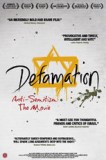| Reviews & Columns |
|
Reviews DVD TV on DVD Blu-ray 4K UHD International DVDs In Theaters Reviews by Studio Video Games Features Collector Series DVDs Easter Egg Database Interviews DVD Talk Radio Feature Articles Columns Anime Talk DVD Savant Horror DVDs The M.O.D. Squad Art House HD Talk Silent DVD
|
DVD Talk Forum |
|
|
| Resources |
|
DVD Price Search Customer Service #'s RCE Info Links |
|
Columns
|
|
|
Defamation
Yoav Shamir's Defamation is a fascinatingly honest and open personal documentary that seldom steps wrong until its final moments, when he kind of blows it (more on that presently). Shamir, an Israeli director, takes on the broad and difficult concept of anti-Semitism--specifically, is it a prevalent and terrifying threat that could tip the world into another Holocaust, or a scare tactic used for purposes of guilt, fundraising, and attention to agendas?
The truth of the matter is, it's probably somewhere in between. Shamir's film is distinctively homemade (right down to the handwriting style of the on-screen text), but he certainly doesn't lack for ambition; he travels from Israel to America to Moscow to Poland to points in between, talking to school kids, fellow journalists, activists, professors, and his slightly crazy grandmother. He spends a great deal of time with Abe Foxman, the head of the Anti-Defamation League, sitting in on meetings and accompanying him to forums. He tries to find a case of anti-Semitism that he can follow ("Every film needs a drive," he explains to a lawyer).
But the story that he ends up telling is one of in-fighting and voices of dissent. Foxman represents the voices of those who feel that the ubiquity of anti-Semitism is a continuing threat to the Jewish people. But then he meets Professor Norman Finkelsetin, the controversial author, who theorizes that anti-Semitism is a ploy used to silence critics. In the struggle over their warring ideologies, Shamir finds a powerful conflict to hang his film on.
Many other voices are heard, and one of the film's most interesting elements is how he keeps turning our expectations on their head. In chasing the story his film needs for "drive," he talks to a Jewish reporter who off-handedly spews some semi-alarming racism. He talks to a group of New York African-Americans who claim no beef with their Jewish neighbors, and then proceed to pontificate ridiculous (and vile) theories of the "Jews are evil and run everything" variety.
His interview strategy is one of the simplest but most effective: he lets people keep talking. An astonishing percentage of the time, even the most reasoned and thoughtful interview subject, allowed the rope of uninterrupted camera time, will proceed to hang themselves. He talks to a couple that represent the West coast branch of the ADL, and they end up confessing that they don't agree with a lot of what they're supposed to agree with. Foxman himself seems an incredibly bright and effective guy, but he'll occasionally carry his logic to a realm that can only be called paranoia. Most disturbingly, Finkelstein gives a piercing rebuke to "warmongers from the Hamptons" which had people in our theatre laughing and cheering--and then he proceeds to compare Foxman to Hitler, a comparison that he only withdraws because it "isn't fair to Hitler."
Shamir manages to be fair and still personal; he lets everyone say their peace, as borderline insane as it may turn out to be. It's occasionally worrisome but, it seems, accurate--there are no good guys and bad guys in the film, no easy targets, no black or white. It's all shades of grey, too complex and difficult for easy designations.
That's why his final voice-over is such a misfire. Throughout the film, he has followed a group of Israeli students as they prepare for an extended trip to visit the sites of the Holocaust's greatest crimes. Early in the trip, there is a riveting sequence where they visit a concentration camp and feel horrible--but only for not getting more emotional. Later, however, they go Auschwitz, and it is powerful and moving. Shamir doesn't interfere, doesn't ask so much as a question. He hangs back and observes. But then, in the final scene, he offers up a brief and not-terribly-insightful voice-over, wrapping it up with his take on the issue. The film, and the issues it addresses, are too inscrutable for that, and the efficacy of the final sequence doesn't require a director to come in and tell us what to think. We've put it together for ourselves--and some of us may have arrived at a different conclusion than he does.
Jason lives in New York. He holds an MA in Cultural Reporting and Criticism from NYU.
|
| Popular Reviews |
| Sponsored Links |
|
|
| Sponsored Links |
|
|
| Release List | Reviews | Shop | Newsletter | Forum | DVD Giveaways | Blu-Ray | Advertise |
|
Copyright 2024 DVDTalk.com All Rights Reserved. Legal Info, Privacy Policy, Terms of Use,
Manage Preferences,
Your Privacy Choices | |||||||











